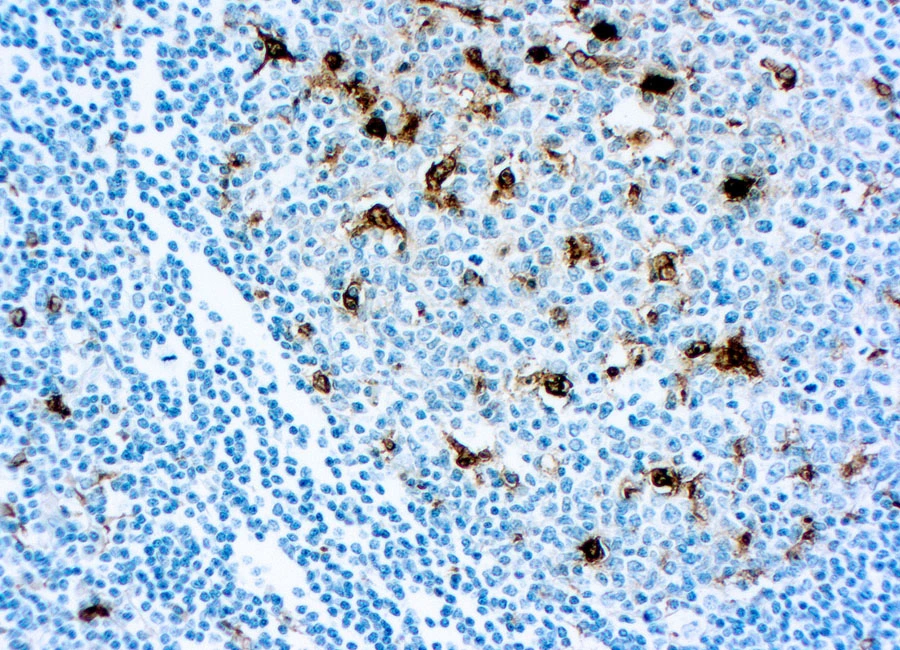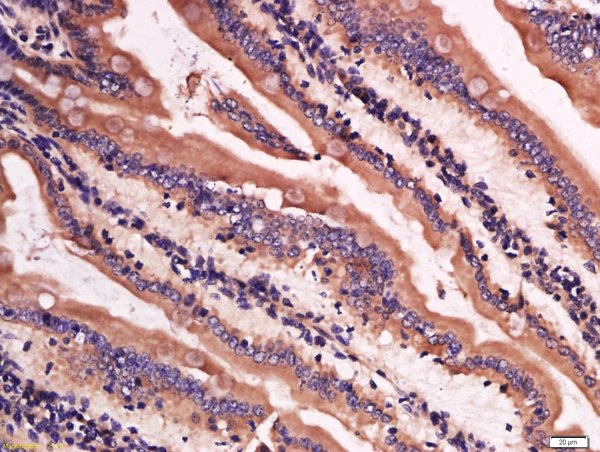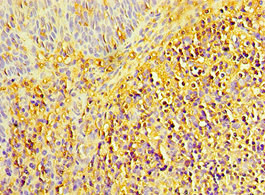
IHC-P analysis of human tonsil tissue using GTX72913 Lysozyme antibody.
Lysozyme antibody
GTX72913
ApplicationsImmunoHistoChemistry, ImmunoHistoChemistry Paraffin
Product group Antibodies
ReactivityHuman
TargetLYZ
Overview
- SupplierGeneTex
- Product NameLysozyme antibody
- Delivery Days Customer9
- Application Supplier NoteIHC-P: 1:50-1:100. *Optimal dilutions/concentrations should be determined by the researcher.Not tested in other applications.
- ApplicationsImmunoHistoChemistry, ImmunoHistoChemistry Paraffin
- CertificationResearch Use Only
- ClonalityPolyclonal
- ConjugateUnconjugated
- Gene ID4069
- Target nameLYZ
- Target descriptionlysozyme
- Target synonymsAMYLD5, LYZF1, LZM, lysozyme C, 1,4-beta-N-acetylmuramidase C, c-type lysozyme, lysozyme F1
- HostRabbit
- IsotypeIgG
- Protein IDP61626
- Protein NameLysozyme C
- Scientific DescriptionThis gene encodes human lysozyme, whose natural substrate is the bacterial cell wall peptidoglycan (cleaving the beta[1-4]glycosidic linkages between N-acetylmuramic acid and N-acetylglucosamine). Lysozyme is one of the antimicrobial agents found in human milk, and is also present in spleen, lung, kidney, white blood cells, plasma, saliva, and tears. The protein has antibacterial activity against a number of bacterial species. Missense mutations in this gene have been identified in heritable renal amyloidosis. [provided by RefSeq, Oct 2014]
- ReactivityHuman
- Storage Instruction2°C to 8°C
- UNSPSC12352203
References
- Kanno T, Katano T, Ogawa I, et al. Protective Effect of Irsogladine against Aspirin-Induced Mucosal Injury in Human Induced Pluripotent Stem Cell-Derived Small Intestine. Medicina (Kaunas). 2022,59(1). doi: 10.3390/medicina59010092Read this paper
- Zwiggelaar RT, Lindholm HT, Fosslie M, et al. LSD1 represses a neonatal/reparative gene program in adult intestinal epithelium. Sci Adv. 2020,6(37). doi: 10.1126/sciadv.abc0367Read this paper
- Fujii M, Matano M, Toshimitsu K, et al. Human Intestinal Organoids Maintain Self-Renewal Capacity and Cellular Diversity in Niche-Inspired Culture Condition. Cell Stem Cell. 2018,23(6):787-793.e6. doi: 10.1016/j.stem.2018.11.016Read this paper
- Otsuka K, Suzuki K. Differences in Radiation Dose Response between Small and Large Intestinal Crypts. Radiat Res. 2016,186(3):302-14. doi: 10.1667/RR14455.1Read this paper






